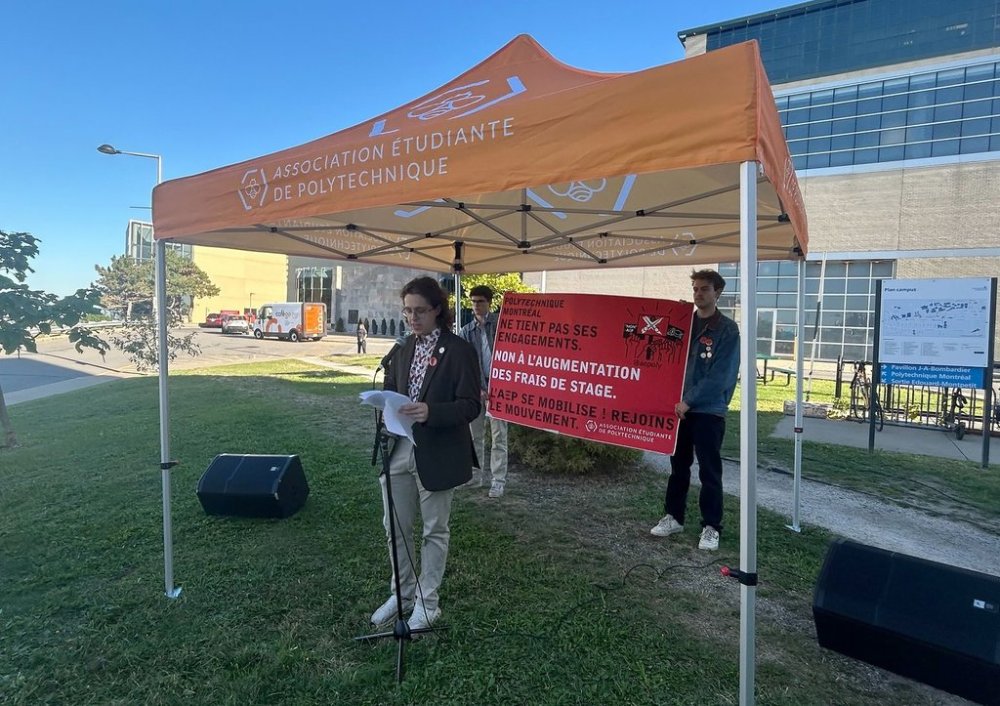Union for over 7,000 engineering students at Polytechnique in Montreal to strike
Advertisement
Read this article for free:
or
Already have an account? Log in here »
To continue reading, please subscribe:
Monthly Digital Subscription
$0 for the first 4 weeks*
- Enjoy unlimited reading on winnipegfreepress.com
- Read the E-Edition, our digital replica newspaper
- Access News Break, our award-winning app
- Play interactive puzzles
*No charge for 4 weeks then price increases to the regular rate of $19.00 plus GST every four weeks. Offer available to new and qualified returning subscribers only. Cancel any time.
Monthly Digital Subscription
$4.75/week*
- Enjoy unlimited reading on winnipegfreepress.com
- Read the E-Edition, our digital replica newspaper
- Access News Break, our award-winning app
- Play interactive puzzles
*Billed as $19 plus GST every four weeks. Cancel any time.
To continue reading, please subscribe:
Add Free Press access to your Brandon Sun subscription for only an additional
$1 for the first 4 weeks*
*Your next subscription payment will increase by $1.00 and you will be charged $16.99 plus GST for four weeks. After four weeks, your payment will increase to $23.99 plus GST every four weeks.
Read unlimited articles for free today:
or
Already have an account? Log in here »
MONTREAL – The union representing more than 7,000 engineering students at Polytechnique in Montreal says it will strike next week, after the university announced it would phase out grants aimed at offsetting education costs.
Polytechnique had offered the grants since 2014 to help students pay for mandatory internships, but the school recently said it would stop offering them by the 2027 winter semester.
For Canadian students outside Quebec, their fees will more than double. Gabriel Comby, president of the Polytechnique student union, says the administration shouldn’t be placing its financial burdens on students.

“This money will come from the pockets of students from the regions, whose parents can’t afford to pay for an apartment in Montreal, and who struggle to make ends meet,” he said outside of the school Monday. “This money will come from the pockets of students who have to line up at food banks every week just to fill their fridge.”
The two-day strike will run Sept. 25-26, he said, during which students are expected to boycott classes. More than 700 students participated in last week’s strike vote, with 93 per cent in favour.
“An internship should be a key,” said Zaga Mendez, the youth critic for the Québec Solidaire political party, who came out to support the students. “It opens up doors into the job market, but unfortunately with this type of decision, it will open the door to debt — debt that is growing day by day with the cost of living constantly increasing.”
According to the university, Quebec residents will have to pay about $572 more in internship fees once the grants are fully phased out. For out-of-province students, as well as students from France and Belgium, the increase will be about $1,856.
Comby says the union’s calculations indicate the fee hikes by the winter of 2027 will represent a rise of 105 per cent for Quebec residents and 151 per cent for out-of-province students.
Internship grants, meanwhile, will still be offered past winter 2027 for international students outside France and Belgium, and for some students in specialized co-op programs, and those who are approved for optional internships.
“We aren’t withdrawing the grants across the board,” said Pierre Langlois, the director of academic affairs at the university.
As well, he said, if a student finds an internship on their own instead of going through the university’s job board, the fees will be reduced by as much as half.
Langlois emphasized that students tend to be well paid during their internships, with the average wage coming out to $24 per hour, according to figures they’ve gathered between 2022 and this year. The university says that once students graduate, their starting salaries average about $76,000, he said.
Langlois said that he understands why students are worried, but said the school’s financial situation has changed significantly from when the grant was first introduced in 2014.
“We have big plans for Polytechnique. We’re constantly looking at how we can improve both the education, and the experience students get to have here,” he said, adding that plans for new facilities, services and an updated IT system are currently underway.
Comby said the university’s ambitions are not in line with its means.
“We are not questioning the fact that internships are a positive thing,” he said. “What we are questioning is the approach that was taken, to demand that students complete an internship, while at the same time deciding to double the fees involved. This seems to us to be a somewhat opportunistic strategy.”
This report by The Canadian Press was first published Sept. 15, 2025.

